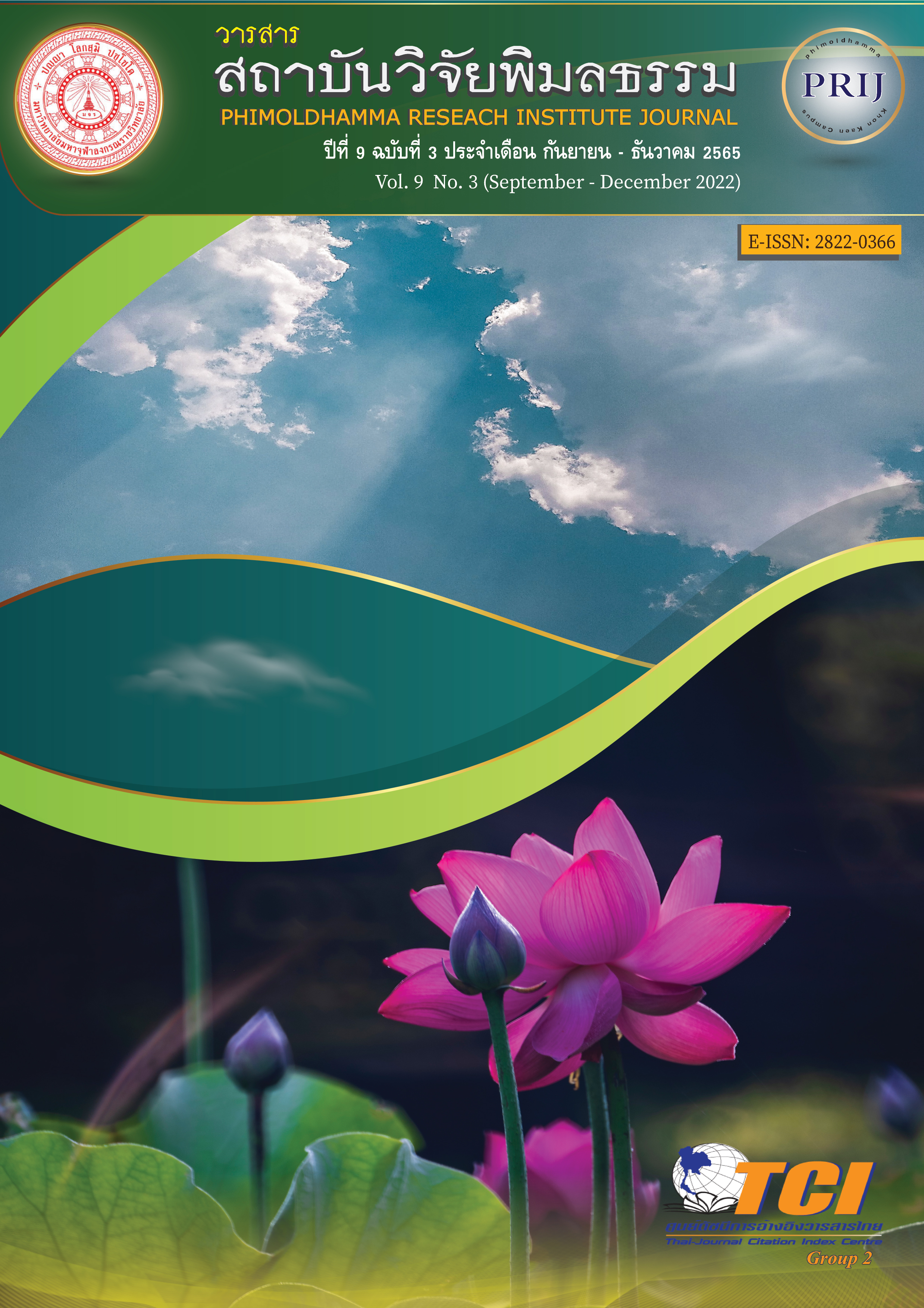การพัฒนาชุดการสอนเรื่อง ภาวะโลกร้อน โดยใช้วิธีการเรียนรู้แบบ 4 MAT ของนักเรียนระดับชั้นมัธยมศึกษา ในสหวิทยาเขตลุ่มน้ำปาว จังหวัดอุดรธานี
คำสำคัญ:
ชุดการสอน, วิธีการเรียนรู้แบบ 4 MAT, ภาวะโลกร้อนบทคัดย่อ
การวิจัยครั้งนี้ มีวัตถุประสงค์เพื่อ 1) พัฒนาประสิทธิภาพชุดการสอน 2) ศึกษาผลสัมฤทธิ์ทางการเรียนของนักเรียน 3) ศึกษาความพึงพอใจของนักเรียนต่อการจัดการเรียนรู้ และ 4) เสนอแนะแนวทางในการพัฒนาชุดการสอน เรื่อง ภาวะโลกร้อน วิชา ภูมิศาสตร์ ของนักเรียนระดับชั้นมัธยมศึกษา โดยใช้กิจกรรมการเรียนรู้แบบ 4 MAT กลุ่มเป้าหมายที่ใช้ในการวิจัยครั้งนี้ คือ นักเรียนระดับชั้นมัธยมศึกษาปีที่ 4 ภาคเรียนที่ 2 ปีการศึกษา 2564 ของโรงเรียนสามพาดพิทยาคาร จำนวน 30 คน และ ตัวแทนครู กลุ่มสาระสังคมศึกษา ของโรงเรียนในสหวิทยาเขตลุ่มน้ำปาว สำนักงานเขตพื้นที่การศึกษามัธยมศึกษา อุดรธานี จำนวน 7 คน โดยอาศัยการเลือกแบบเจาะจง (Purposive sampling) สถิติที่ใช้ในการวิเคราะห์ข้อมูล คือ การหาค่าความถี่ ค่าร้อยละ(Percentage) ค่าเฉลี่ย(Mean) และส่วนเบี่ยงเบนมาตรฐาน (Standard Deviation) ผลการวิจัยสรุปได้ดังนี้ผลการวิจัยพบว่า
1. ประสิทธิภาพของชุดการสอน E1 เท่ากับ 87.42 และ ประสิทธิภาพของผลลัพธ์ E2 เท่ากับ 85.14 ดังนั้น ชุดการสอน เรื่อง ภาวะโลกร้อน โดยใช้วิธีการเรียนรู้แบบ 4 MAT ที่ผู้วิจัยพัฒนาขึ้นมีประสิทธิภาพ (E1/E2) เท่ากับ 87.42/85.14 ซึ่งถือว่าสูงกว่าเกณฑ์ 80/80
2. ผลสัมฤทธิ์ทางการเรียนของนักเรียนก่อนเรียนมีคะแนนเฉลี่ยอยู่ที่ 14.97 คะแนน จากคะแนนเต็ม 35 คะแนน คิดเป็นร้อยละ 42.76 หลังจากเรียนด้วยด้วยชุดการสอน คะแนนสอบมีคะแนนเฉลี่ยเท่ากับ 29.80 จากคะแนนเต็ม 35 คะแนน คิดเป็นร้อยละ 85.34 โดยนักเรียนร้อยละ 70 มีผลสัมฤทธิ์ทางการเรียนเฉลี่ยมากกว่าร้อยละ 70
3. ความพึงพอใจของนักเรียนที่มีต่อชุดการสอน พบว่า โดยภาพรวมอยู่ในระดับดี
4. แนวทางในการพัฒนาชุดการสอนการเรียนรู้จากการทำกิจกรรมตามความสนใจ และได้ใช้ทักษะการคิดค้นด้วยตนเอง นำความคิดไปปรับใช้ เหตุการณ์จริงที่เกิดขึ้น ส่งเสริมผู้เรียนให้ทดสอบความคิดปรับกระบวนการเรียนรู้ของผู้เรียนให้เข้ากับสถานการณ์ต่างๆ และนักเรียนได้ฝึกทักษะการเรียนรู้ ศึกษา ค้นคว้า เรียนรู้ด้วยตนเอง และพัฒนาพฤติกรรมในการเรียนรู้
เอกสารอ้างอิง
ขวัญชนก นัยจรัญ. (2564). การพัฒนาชุดการเรียนรูปตามรูปแบบการเรียนการสอนแบบตกผลึกเพื่อส่งเสริมความสามารถในการวิจารณ์วรรณกรรมของนักศึกษาระดับปริญญาตรี. วารสารครุศาสตร์จุฬาลงกรณ์มหาวิทยาลัย, 49(3), 1-13.
ปาริฉัตร ภู่ทอง. (2559). การพัฒนาชุดการสอนสาหรับครูโดยใช้กิจกรรมการเรียนรู้แบบ 4 MAT เรื่อง โครงสร้างและหน้าที่ของพืชสำหรับนักเรียนชั้นมัธยมศึกษาปีที่ 5 กลุ่มโรงเรียพัฒนาท่าจีน. Veridian E-Journal, Silpakorn University, 9(3), 573-587.
พัชรานุช บ้งชมโพธิ์. (2560). การเปรียบเทียบผลสัมฤทธิ์ทางการเรียนรู้ และการคิดอย่างมีวิจารณญาณ เรื่อง ภูมิศาสตร์ประเทศไทย กลุ่มสาระการเรียนรู้สังคมศึกษาศาสนาและวัฒนธรรมของนักเรียนชั้นมัธยมศึกษาปีที่ 1 ระหว่างการจัดกิจกรรมการเรียนรู้แบบ 4 MAT และแบบใช้แผนผังความคิด. (วิทยานิพนธ์ครุศาสตรมหาบัณฑิต). นครพนม: มหาวิทยาลัยนครพนม.
พระอธิการมาวิน จนฺทธมฺโม (อ้วนจี). (2561). การพัฒนาชุดการสอนสาระการเรียนรู้สังคมศึกษาศาสนาและวัฒนธรรมโดยใช้พุทธวิธีการสอน เรื่อง เบญจศีลเบญจธรรมนักเรียนชั้นมัธยมศึกษาปีที่ 3 โรงเรียนบ้านผึ้งวิทยาคม จังหวัดนครพนม. (วิทยานิพนธ์พุทธศาสตรมหาบัณฑิต). พระนครศรีอยุธยา: มหาวิทยาลัยมหาจุฬาลงกรณราชวิทยาลัย.
พิริยา สร้อยแก้ว. (2560). ผลการจัดการเรียนรู้แบบ 4 MAT ที่มีต่อผลสัมฤทธิ์ทางการเรียนวิชาคณิตศาสตร์และความคงทนในการเรียนรู้ของนักเรียนชั้นประถมศึกษาปีที่ 5. (วิทยานิพนธ์ศิลปศาสตรมหาบัณฑิต). สงขลา: มหาวิทยาลัยสงขลานครินทร์.
มาริสา แสนสุข. (2558). ผลสัมฤทธิ์ทางการเรียนของนักเรียนชั้นมัธยมศึกษาปีที่ 2 ในกิจกรรมการเรียนรู้ แบบวัฏจักร (4 MAT) เรื่อง กฎหมายกับการดำเนินชีวิตประจำวัน สาระการเรียนรู้สังคมศึกษา ศาสนาและวัฒนธรรม. วารสารมหาวิทยาลัยนครพนม, 5(1), 99-106.
รพีพรรณ เพชรอนันต์กุล. (2563). การพัฒนาชุดการสอนการเขียนภาษาไทยอย่างมีประสิทธิผลสำหรับนักศึกษาชั้น ปีที่ 1 มหาวิทยาลัยรังสิต. วารสารช่อพะยอม, 31(2), 95-109.
ศิริสุดา คณะศิริวงษ์. (2559). การพัฒนาผลสัมฤทธิ์ทางการเรียน การคิดวิเคราะห์และเจตคติต่อรายวิชาสังคมศึกษาศาสนาและวัฒนธรรม สาระภูมิศาสตร์โดยการจัดการเรียนรู้แบบ 4 MAT และแบบสืบเสาะหาความรู้ 7 ขั้น ของนักเรียนชั้นมัธยมศึกษาปีที่ 5. (รายงานการวิจัย). มหาสารคาม: มหาวิทยาลัยมหาสารคาม.
สำนักวิชาการและมาตรฐานการศึกษา. (2553). แนวทางการบริหารจัดการหลักสูตรตามหลักสูตรแกนกลางการศึกษาขั้นพื้นฐาน พุทธศักราช 2551. กรุงเทพฯ: ชุมนุมสหกรณ์การเกษตรแห่งประเทศไทย.






